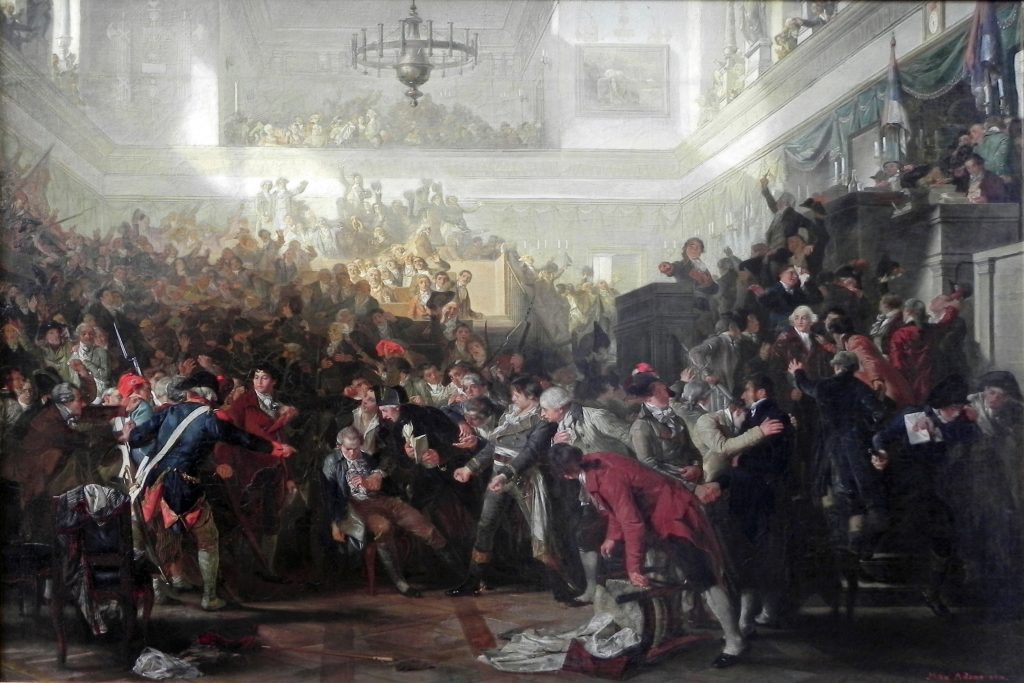No, I am not talking about Bernie Sanders’ revolution, I am talking about the one and only revolution that ever happened in American history.
But let me start by taking a step back. I always felt that the most exceptional thing about the United States was the fact that its political institutions have been virtually the same for over 220 years. This appears even more unique when you take into account that throughout this entire time period, democratic voting has been the default mechanism to put people in and out of office. There are some exceptions of course, such as the Civil War and four presidential assassinations. But still, compared with, let’s say, France, which is on its fifth republic since the French revolution and went through two Napoleonic empires and several more revolutions along the way, the United States always looked like the long-standing haven of democratic solidity, pragmatism and reliability. It looked even better from the perspective of my home country, Germany, with its mix of monstrous Reichs and numerous attempts at democracy that failed until finally the United States and its allies helped out after WWII.

I used to remind my fellow Germans of this simple fact when they would blast America for being a country with a lack of culture and history. I think I used words like “mature” and “time-tested” when I came to the defense of the Americans and their political system. Well yes, I did. Now I wonder if I had it all wrong.
I wonder if having the same system over such a long time produces complacency rather than maturity. Maybe occasional system breakdowns and fresh starts are necessary to prevent societies from getting carried away with their national pride. Today, the chest-beating in America about its greatness, glorious history and unbeatable military is more widespread, louder, and frankly more disgusting, than at any time I can remember. On a more subtle level, I was recently struck by question 69 in the US Citizenship test that asks: Who is the “father” of our country? This is the kind of question I would expect if I applied for citizenship in North Korea but not in a western democracy. If you watch the YouTube presentation of the test questions, it’s even more disturbing since you don’t hear the quotation marks that U.S. Citizen and Immigrations Services, to its credit, has put around father of our country in that question.
Assigning father status to 285 year-old George Washington doesn’t have any legal consequences today. Assigning sacred status to a constitution that is not much younger but still in use does. The fuzzy syntax of the 2nd amendment, for example, dating from 1789 has led to wildly different interpretations. Depending on whether you apply the grammar rules of the 18th or the 21st century, its emphasis is on a state’s right to resist the federal government or on an individual’s right to bear arms for any occasion. I can’t help but think that this linguistic dilemma would have been solved long ago had the US gone through as many system changes and constitutional do-overs as other, less exceptional countries. How about leaving out the guns and just say, “All citizens shall have the right to resist any person seeking to abolish this constitutional order, if no other remedy is available.” Nothing exotic, pretty straightforward 20th century grammar and already in use elsewhere. This sentence is actually taken from article 20 of the current German Grundgesetz, the constitution drafted after WWII designed to forever prevent another Führer to come to or stay in power. So far the Grundgesetz has achieved its goal. It should be noted that it was implemented with the sponsorship and strong support of what was then the United States government. Based on the latest State of the Union speech it seems likely that in this country we will be stuck with the ambiguities of 18th century language for a while: “We are appointing judges who will interpret the Constitution as written.” Oh dear God!
Addendum: Only 2 days after this article was posted 17 people were killed during a shooting at a high school in Florida. The semiautomatic rifle used in the shooting was acquired by the 19-year old alleged shooter in accordance with Florida gun laws that were presumably inspired by “interpreting the Constitution as written.”
Henning Schroeder is the former dean and vice provost of graduate education at the University of Minnesota. As a faculty member in the College of Pharmacy his research has focused on antioxidant genes and cardiovascular disease, despite a lifelong passion for history and politics.

Comments